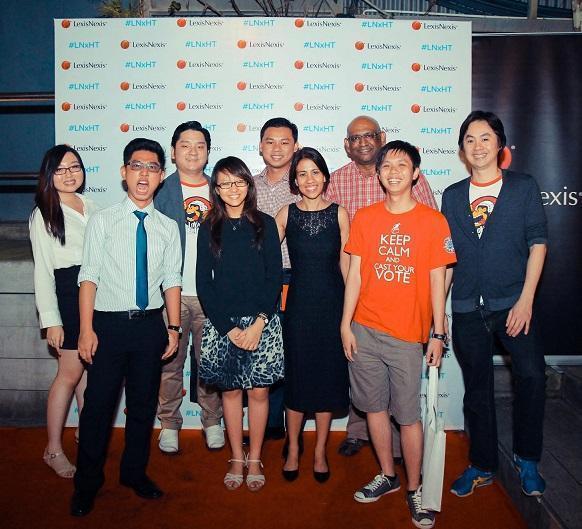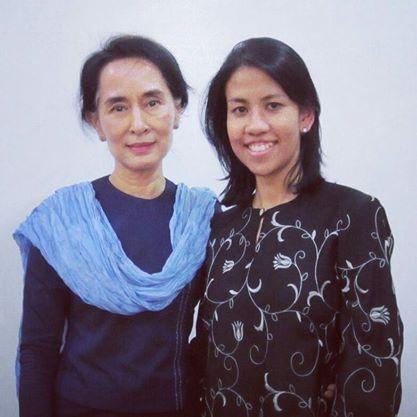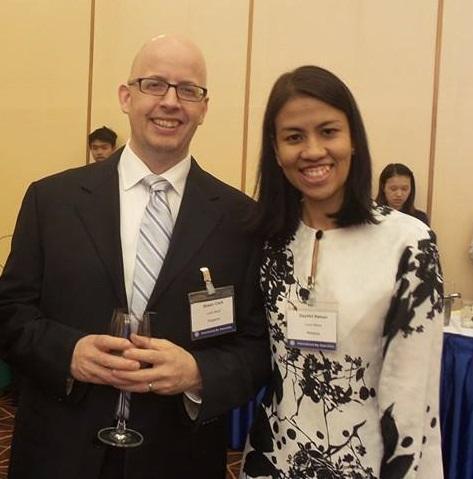A speech by Gaythri Raman at the Gala Dinner of the LexisNexis Asia Pacific Kick Off 2014, Raffles Hotel, Singapore on 2 April 2014.
Good evening everyone. Tonight, I am going to tell you two stories:
The first is the story of Gloria Bon. I first met her in 2012. We had all been asked to find ways to screen the documentary, Not My Life. It talks about human trafficking and I wanted to host an event, maybe get our customers together, then screen it, share the story. So I asked my student ambassador Cheryl to research local NGOs. I thought, let’s raise funds for them.
I met Gloria for coffee and I proceeded to talk about LN and my grand plans to host this fundraising. Halfway through the conversation, she asked me, “Have your read the latest TIP report?” This is the Trafficking In Persons Report, and it ranks countries based on the severity of the problem within those countries. I hadn’t. Then she asked, “Do you know CAMSA? Do you know MAPO?” — I was frantically writing these down, panicking.
You should know this, Gloria used to be a schoolteacher. She is tough. One glare from her and you’d all hide under your table right now.
She then said, “If you just want to organize an event without understanding what the problem is, what challenges we face, what our pain is, then don’t waste my time.”
She woke me up. I felt like I was slapped on the face. I went back, did a lot of reading the next few days. I read all the reports. Then I called Gloria.
She connected me with all the right people and we started engaging with the experts and the people who were fighting the cause in Malaysia. We took the trouble to understand the problem, then used our knowledge, resources, connections and expertise to create a solution.
Our “event” now became a solid campaign to educate people about human trafficking, specifically migrant worker issues. It became the talk of the town, the talk outside the town, and inspired so many.
That was in September 2012. A lot has happened since then.

People started coming to us to help advance the rule of law. We worked with law schools, we worked with the Bar, we worked with the judiciary in so many countries. We used social media and our campaigns went viral. We had 18,000 live stream views in an afternoon at our human rights debate. We were trending at #1 on Twitter. We moved the needle.
Gloria shamed me into thinking differently. And as a result, we really thought about the impact we wanted to make and then we moved that needle. We went from being event organizers or sponsors to being innovative thought leaders. We care, and that shows.
Our customers come up to me and tell me “LexisNexis is doing great work. Keep it up.” — They tell me that we inspire them. We aren’t just mere vendors but we want to change the world for the better, and so do they. They feel good and we feel good. They tell me they want to hire our student ambassadors. They recommend their friends to work for us. We matter.
My second story is about going to the moon.
I made my first trip to Myanmar in August last year. The country had been under military rule for more than 50 years. They shut down universities for years, the courts system regressed to nothing, laws were disregarded. Aung San Suu Kyi, the human rights activist and pro-democracy leader was placed under house arrest for almost 2 decades because of what she stood for. Rule of law in Myanmar was absent.
Then in November 2010, she was released. She won a seat in Parliament and is now Chair of the Parliamentary Rule of Law Committee. Myanmar is now headed on a path to democratization.
Aung San Suu Kyi, knowing how critical the rule of law is to her country, agreed to meet with me. This was my hero, she fought hard for her country and I never imagined that I would even be in the same room, let alone have 30 minutes with her. I was going to the moon.
I was told to call her Daw Suu. She is amazing. She has this energy around her — she exudes it and it is contagious. It is positive, always looking forward and there isn’t a hint of bitterness, no negativity in the card she had been dealt. She wants to get moving, don’t waste time. Of course — she has lost so much time.
We talked about how to make laws accessible to her people, not just to lawyers. She wants to empower her people with knowledge of the law and we discussed ways to make laws consumable. She talked about a set of Farmland laws which were created to address land grabbing issues in Myanmar and wanted to educate these farmers about them. It was a working meeting and I forgot for a moment who she was and we spoke as equals, with the same goals.
She said Parliament was overwhelmed. This is a fledgling democracy. They were shut off from the world for so long and now these MPs have complicated Bills starting at them — Power people, Land, Energy, Telecommunications, so we discussed training programs for the MPs, ways to build competency. I was then asked to train 60 MPs the next day on the importance of legal research to lawmaking.
We discussed constitutional reform. There are aspects in the current constitution which need reform — we discussed how we could effectively heighten awareness to how important it is to the nation’s rebuilding.

During that trip, I also met with the Attorney General, members of the legal profession, engaged with law students and the academia and just immersed myself in discovering this country.
I began to piece together this puzzle that was Myanmar and I saw gaps and I saw how we could help. I was scheduled to attend the Rule of Law Summit in New York in September and I knew that the UN Secretary General, Ban Ki Moon was going to be there. I wanted to talk to him, tell him we need to work together, aid needs to be better coordinated. We, LexisNexis can help.
I remember having this light bulb moment on a Saturday in Naypyitaw. There is nothing to do there. I was rotting in my hotel room, thinking about how we could move the needle. I emailed Shawn Clark and I said — “I want time with Ban Ki Moon. I want to pitch to him this idea of coordinating aid. I want to say to him that we, LexisNexis can facilitate this. We connect the dots and we know enough to do this.”
My email to Shawn, I am sure, wasn’t very coherent. I remember writing, “Can you please talk to Mike? Can you ask Mike to help me get face time with Ban Ki Moon?” and then a whole day passed and there was no reply. Sunday morning came, and I emailed Shawn again, saying “What’s wrong? Don’t you like my idea? Am I asking too much? Do you want me to tone it down?” and 10 minutes later Shawn replies, “Just because I don’t respond immediately, it doesn’t mean I don’t like the idea. It just means I am busy. I had guests over last night!”
So, Shawn spoke with Mike, and then Ian and Stephanie Sommese said, “explain to us what you need” — and we had a video conference and I told my story and they connected me with the UN Global Compact folks even before the summit. Then Mike and I had a VC and I remember Mike started by saying, “tell me your story” and he ended that VC by saying — “What is your ask, Gaythri?”
My leaders took time to understand what the issue was. They paid attention to what I had to say. None of them said no to me. I went to New York, then met with Ban Ki Moon, got his support, spoke to the right people and then came home and acted on my plan. So, we were now at the table, engaging with people who were shaping this nation and giving our input.

In October, I made my second trip to Myanmar. We organised a Constitutional Awareness Workshop for 100 lawyers in Yangon. We partnered with experts from the Bingham Centre for Rule of Law and we created relevant and useful content in two languages and designed a “Train the Trainers” style workshop for lawyers. Always with Gloria in the back of my mind, I said, let’s empower the lawyers. Let’s teach them and then also get them to pay it forward.
On 14 October 2013, we changed the lives of 100 lawyers. They came, were broken into three groups, and there were three of us facilitating.
We discussed constitutions around the world, we discussed women’s rights within the constitution, we discussed ownership of land and access to water. We discussed the right to vote, freedom of speech and other aspects which would adequately protect the people of this nation. We had academic discussions, then practical ones.
At the end of that day, one woman lawyer stood up, held the constitution up with her hand and said to me, “I am sad for my friends who missed this. I am empowered. Just like how we go to the villages and give vaccinations to women and children, we should go to the villages and teach the people about the constitution because this is like a vaccine.” It was perfectly described. I was humbled.
Two weeks after that, lawyers who came to our workshop went on a nationwide bus tour to six cities and changed the lives of thousands.
We are working with various parties within the country, helping them rebuild this nation. Our input is welcome and valued and we are using our expertise to really make an impact. It is so fulfilling.
Just think about it. We started with 100 lawyers. We are now going to change the lives of 63 million people.
Everyone wants to work with us, partner us. There is so much excitement ahead of us. We will be forming a Rule of Law Working Group to support competency building of the legal profession in countries which need it, starting with Myanmar. We want to change the world, and we will.
Myanmar taught me a lot. This isn’t something that is foreign to us. This is something we do all the time. We just don’t realise it. We can stand together with heads of state and help shape the legal landscape of nations for the better. Our customers see that we care and we are no longer mere vendors. We matter.
I have a lot more to share. I can talk for days about this, but I will let you get on with dinner.
I am going to end with two points:
#1 — People ask me, “There are so many problems out there, where do I start?” Yes, the world is full of injustice, challenges, problems, pain. Pick one that resonates and really understand it. Then, find ways to move that needle. Make an impact. That is what I learned from Gloria.
#2 — This is the Asia Pacific Leadership Kick Off. We are all leaders. Think about how your actions influence your people. If you don’t believe in it, your people will see through you. If you embrace it, your people will be motivated, inspired, and aim for the moon too.
If my leaders hadn’t supported me, I wouldn’t have gone to the moon.
I stand here, telling you my story because they encouraged me to fly.
Thank you and goodnight, everyone.

Nice!